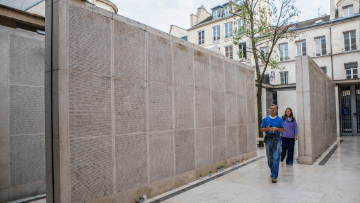- Both institutions formalize a collaboration agreement in the framework of the European Observatory on Memories to promote education and multidisciplinary research on the Holocaust, genocide and mass atrocities;
- The agreement features an annual training program of teachers and education professionals in Catalonia and Portugal with the aim of tackling racism, xenophobia, and anti-Semitism;
- It will be signed by Jaques Fredj, director of the Memorial de la Shoah, and Maite Vilalta, vice-rector of Equality and Social Action of the University of Barcelona next Tuesday, October 29 at 5:30 p.m., at the University of Barcelona;
- The institutional event will be followed by the conference “Antisemitism, new response to a never-ending challenge”, delivered by Jaques Fredj at 6:30 p.m.
The European Observatory on Memories (EUROM), the multidisciplinary and transnational network of public policies of memory promoted by the University of Barcelona Solidarity Foundation, and the Memorial de la Shoah formalize a collaboration agreement with the aim of promoting the uses of the past to confront current social conflicts, especially racism, xenophobia and anti-Semitism. The agreement consolidates the cooperation that began two years ago with the training of teachers and professionals of education in Catalonia and Portugal in the field of the Holocaust, mass genocide and atrocities.
The director of the Memorial de la Shoah, Jaques Fredj, and the vice-rector for Equality and Social Action of the University of Barcelona, Maite Vilalta, will sign the agreement on Tuesday, October 29 at 5:30 p.m. in the Board Room of the University of Barcelona. Later, at 18:30, Fredj will deliver the public conference “Anti-Semitism, new response to a never-ending challenge“.
The Shoah Memorial is an active and well-known institution in research, documentation, publishing, teaching, training and cultural mediation. Its origins go back to a clandestine archive created in 1943 by the industrialist of Russian origin and a member of the Resistance in France, Isaac Schneersohn, in order to gather evidence about the persecution of Jews. Once France was liberated of the Nazi occupation, the archive became the Center of Contemporary Jewish Documentation (CDJC). These documents were a fundamental support to the French declarations to the Nuremberg Trials and to the subsequent trials of responsible and accomplices of the final solution in Germany, France, and Israel.
The current headquarters of the Shoah Memorial in Paris opened in 2005 at the same place where Schneersohn founded the Memorial to the Unknown Jewish Martyr in 1956. Classified as a historical monument in 1991, this place highlights the Wall of Names, featuring 76 thousand names of Jews deported from France to Nazi camps. Each year, it hosts the main ceremonies related to the Shoah. The building also houses the CDJC archive, a library, a permanent exhibition on deportations, and hosts temporary exhibitions and cultural events. In 2012, the Shoah Memorial opened a museum in Drancy, in front of Muette’s former internment camp.
Created in 2012 with the support of the European Commission, the European Observatory of Memories (EUROM) is committed to the recognition of the diversity of memories. In this regard, and through the promotion of transdisciplinary, transversal and transnational projects, EUROM aims to identify and analyze the diversity of memorial processes in Europe as well as in other continents; to promote debates on representative public policies and to contribute to analysing and managing them; to promote the socialization of memorialist initiatives and real connections between institutions, professionals and researchers. Currently, the EUROM network includes 50 institutions and research groups in Europe and America.

